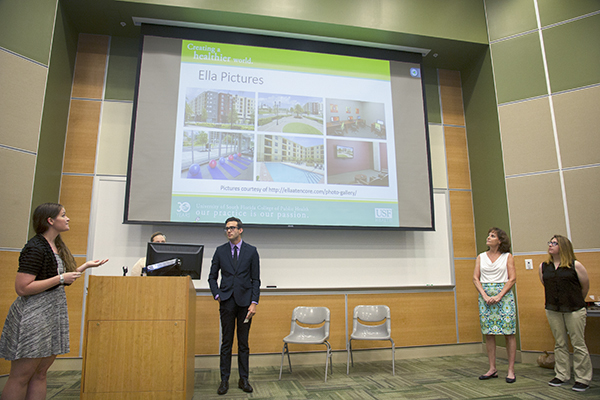The changes reflect the national push to provide today’s public health professionals with real-world concepts that meet today’s public health needs.
The USF College of Public Health is the first in Florida to update curriculum for its master’s degree program, a step that is in tandem with a national effort to better train the public health workforce and improve population health.
The new curriculum – built from concepts found in “Framing the Future: The Second Hundred Years of Education for Public Health” launched earlier this year by the Association of Schools and Programs of Public Health (ASPPH) – incorporates more integrated, real-world coursework that better reflects the realities of today’s public health job settings.
“We have to move into the 21st Century and this new curriculum is better at meeting the needs of today’s students,” said Rita DeBate, PhD, professor and Associate Dean for Academic and Student Affairs for the USF College of Public Health.
Under the direction of Donna J. Petersen, ScD, MHS, CPH, dean of the USF College of Public Health, Dr. DeBate and Jaime Corvin, MSPH, CPH, PhD, assistant professor of public health, worked with a committee of faculty to guide this initiative. For two years they worked with a committee of fellow COPH faculty members to create the new curriculum and last fall the first group began the pilot project.

Last week, the first group made their final presentations for their community-based projects before moving on to the concentration coursework.
***
Like most public health schools, USF’s College of Public Health has long relied on curriculum that is based on out-of-date frameworks. For decades – since the Welch-Rose report of 1915 – public health professionals were required to study five areas considered core competencies: epidemiology, biostatistics, environmental health, health policy and management, and social and behavioral sciences.
Like five silos standing alone, these core competencies rarely shared courses or blended content, Dr. DeBate said. Instead, students could only imagine how one course truly related to the others.
The COPH committee took those competencies, added in seven additional skills determined to be imperative for 21st Century public health professionals (systems thinking, leadership, communication and informatics, diversity and culture, ethics and professionalism, program planning and evaluation, and public health biology) and developed four core courses that incorporate all key concepts and create continuity across student learning with real-world approaches to addressing public health issues.
“We took a step back to think about how these concepts come together in true public health settings,” Dr. Corvin said. “Teaching these concepts in an integrated fashion strengthens all of the concepts, gives students true applicable context and bridges content from one class to the next.”
For example students are now learning about public health biology and genetics, concepts previously void in the curriculum but imperative to 21st Centry Public Health. We discuss the prevalence of certain genetic conditions and differences that may exist by racial/ethnic subgroup. We then move into discussion of the probability that someone who is carrying a certain gene may get the condition, which leads to discussion of legal and ethical issues around genetic testing. This one case highlights the concepts from the original core but requires a holistic understanding of the concepts and critical thinking skills, Dr. Corvin said.
The committee also developed a series of skills labs that dive deeper into areas since not all students come to the classroom with the same set of experiences and some students need bolstering – these skills labs help bring them closer to the same point. Skill labs include: writing, systems thinking, SPSS (a biostatistics software program), leadership, and communications.
***
The new curriculum focuses mostly on the first year for master’s degree students and includes: Intro to History and Systems of Public Health; Population Assessment I and II and Translation to Public Health Practice. Beyond that first year of core courses, master’s degree students dive deeper into courses concentrating on their specialty areas.
In August, the first pilot group of 37 students will complete the new coursework and a second pilot group will begin classes. Dr. Corvin said she expects the second group to be larger.
“Recruiting this fall should be very different from last fall,” Dr. Corvin said. “Last year, was the first test and we were as nervous about the new curriculum as they were. Now I can look them in the eyes and tell them, this works.”
Evaluations from the first group were positive and have been helpful in making revisions for this year’s pilot. If the second group offers similar feedback, the new curriculum will be fully implemented and become the foundational content required of all USF master’s degree students, Dr. Corvin said.
“We’re moving forward into the next wave of education,” Dr. Corvin said. “What we’re doing is meeting students where they are today. They have access to more information than ever. They have Google at their fingertips. With this new curriculum, we’re giving them a very applied, hands on, integrated experience. Students will graduate with real-world, practical knowledge and be better prepared to be today’s public health practitioners.”
Photos by Eric Younghans, USF Health Office of Communications

